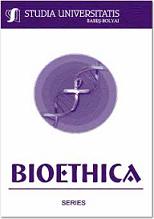PE MUCHIE DE CUŢIT. DREPTUL LA VIAŢĂ / DREPTUL LA MOARTE. PRINCIPII PENTRU UTILIZAREA UNOR MIJLOACE TERAPEUTICE PROPORŢIONATE
ON THE EDGE. THE RIGHT TO LIFE / THE RIGHT TO DIE. PRINCIPLES FOR THE USE OF THE THERAPEUTIC PROPORTIONATE CURE
Author(s): Simona Ştefana ZeteaSubject(s): Anthropology
Published by: Studia Universitatis Babes-Bolyai
Keywords: Euthanasia; life; death; therapeutic insistence; proportionate therapeutic means.
Summary/Abstract: On the Edge. The Right to Life / The Right to Die. Principles for the Use of the Therapeutic Proportionate Cure. What should be a doctor’s attitude when speaking about a cureless patient? Why some doctors tend to use euthanasia and how legitimate is their understanding regarding this? How can a doctor respect the fundamental principle of his profession to defend and save his patient’s life without using, extremely, some therapeutic means? These are the questions I would like to answer to in this article, proposing, as the only solution, the respect of every person’s right to live and, the same time, the right to death. Without pretending.I can offer recipes, I hope to outline in my next ideas, from a theological point of view, a series of ways of reflection regarding the principle of using some proportionate therapeutic means for cureless patients, being convinced that – if the optional anticipation of death is an objective bad thing, the therapeutic insistence is not legitimate. And this because – if each ill person has the right to medical nursing and each doctor has the duty to give it – he does not have to accept the continuation of his life at any risk and in any circumstances. Without doing something or asking to die sooner, the ill person can ask for the breaking of his treatment or can refuse an intervention if these ones are not proportionate with the real and the hoped results or the prognostic of the illness and the doctor can act in the same way after a careful analysis of the case and of the perspectives and after an honest discussion with the patient, after a discussion with the family and with the colleagues who nurse him (medical assistants, psychologists, clerics, priests, maybe), involving in each case with all the professional competence and ethic responsibility.
Journal: Studia Universitatis Babes-Bolyai - Bioethica
- Issue Year: 57/2012
- Issue No: 2
- Page Range: 29-45
- Page Count: 17
- Language: Romanian

